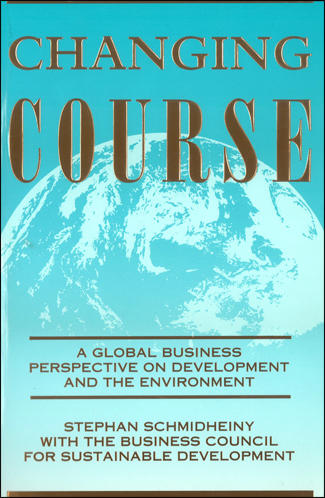
Changing Course is a practical introduction to new and necessary methods of running businesses so that the realities of business and the marketplace support the realities of the environment and the needs of human development.
Gathering the expertise of more than 50 leaders of multinational corporations and backed by an array of case studies showing existing best practices, Changing Course provides an extensive analysis of how the business community can adapt and contribute to the crucial goal of sustainable development—which combines the objectives of environmental protection and economic growth.
All of its recommendations are linked by the belief that only by allowing market forces to operate freely and integrating the "polluter pays" principle into environmental and economic policy can sustainable development be achieved.
Changing Course focuses first on the often adversarial relationship between business and government in chapters that discuss full-cost pricing and market signals, energy, capital markets, trade, and managing change. It shows how environmental costs, which are often invisible, can best be factored into production, investment, and trade. And it calls for a rational long-term energy strategy that balances the energy needs for economic development with a policy shift toward the payment of pollution costs and energy efficiency - changes that demand new thinking and increased flexibility by policy makers in both the public and the private sectors.
Changing Course then explores business to business relationships, beginning with the sensitive topic of corporate reporting in environmental areas and discussion of how an environmentally conscious firm is managed. Chapters look at optimal products and processes, product stewardship in retail and trading companies, at new practices for such renewable resource industries as forestry and agriculture, and at the need for new long-term partnerships to boost economic development and environmental standards in the developing world.
Changing Course concludes with a detailed look at the implications of sustainable development for business in the developing world, where, as former Indian Prime Minister Indira Gandhi pointed out, poverty itself is a great polluter.
Endorsements
"The question is no longer whether business must change to meet the challenges of the global environment, or even when. The issue of the 1990s is how, and Changing Course lays out the most forward-looking guideline in print for harnessing the resources of the modern corporation to the task of environmentally sustainable development. This timely book is nothing less than a roadmap to the corporate future."
- James Gustave Speth, President, World Resources Institute
Editorial reviews
"The book developed by Schmidheiny and the BCSD, Changing Course: A Global Business Perspective on Development and the Environment, has become required reading for enlightened business leaders in the 1990s; it lays out the path for the future of environmental entrepreneurship."
- William K. Reilly (in: United States Environmental Protection Agency Journal, September/October 1992)
About the author
Stephan Schmidheiny is Chairman of Anova Holding AG. A Swiss industrialist, Schmidheiny founded the Business Council for Sustainable Development after he was named Principal Advisor for Business and Industry to the secretary general of the 1992 ‘Earth Summit’ in Rio. He was the principal author of Changing Course and is now the honorary chairman of the WBCSD.
Read about Stephan on his website at http://www.stephanschmidheiny.org/
Ordering information:
Changing Course: A Global Business Perspective on Development and the Environment
Stephan Schmidheiny
April 1992 | 373 p. | ISBN 0-262-69153-1
Order on mitpress.mit.edu

